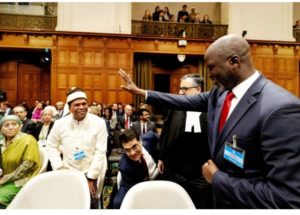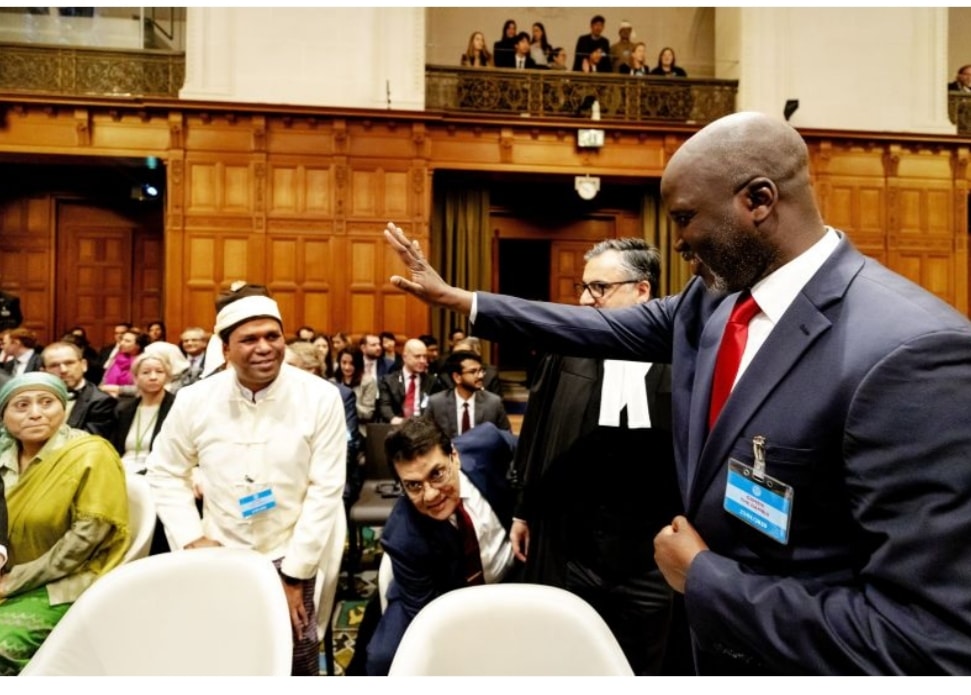 January 23, 2020
January 23, 2020
Justice minister Aboubacarr Tambadou, right, waves to a representative of the Rohingya community at the United Nations’ International Court of Justice
at The Hague. (ANP/AFP via Getty Images)
Justice minister and Attorney General Aboubacarr Tambadou today hailed the Gambia’s historic victory at the UN International Court of Justice (World Court) calling it “a triumph for international justice”.
Mr Tambadou, a former prosecutor at a U.N. tribunal over the Rwanda genocide, took up the Rohingya case, a minority group in Myanmar that the UN has described as “the most persecuted people on earth”, on behalf of the 57-member OIC group of Muslim states.
He successfully argued in front of the ICJ that the Gambia as a signatory to the 1948 Genocide convention has a universal legal duty to prevent genocide against the Rohingya. The ICJ sided with him and ordered Myanmar to take all necessary measures to prevent the genocide of the Rohingya people
“I think this represents a triumph of international law and international justice. And it is the international community – as represented by the ICJ – saying in the strongest of terms that genocide will not be accepted under any circumstances by any perpetrators,” Justice minister Tambadou told the BBC’s Focus on Africa programme.
The court’s final decision could take years, and Thursday’s ruling dealt only with Gambia’s request for preliminary measures. But in a unanimous ruling by the17 judge panel, the court said the Rohingya face an ongoing threat and Myanmar must act to protect them.
“Myanmar must take all measures within its power to prevent all acts” prohibited under the 1948 Genocide Convention, and report back within four months,” presiding Judge Abdulqawi Yusuf said, reading out a summary of the judgement.
“Myanmar must use its influence over its military and other armed groups to prevent violence against the Rohingya intended to bring about its physical destruction in whole or in part”.
Rohingya refugees and activists reacted with joy to the unanimous ruling which also explicitly recognised their ethnic minority as a protected group under the Genocide Convention.
“That is something we have been fighting for a long time: to be recognised as humans the same as everyone else,” Yasmin Ullah, a Canada-based Rohingya activist told Reuters.
Human rights experts welcomed the watershed decision and said it marked an important step for accountability.
“The ICJ order to Myanmar to take concrete steps to prevent the genocide of the Rohingya is a landmark step to stop further atrocities against one of the world’s most persecuted people,” said Param-Preet Singh, associate international justice director at Human Rights Watch.
Payam Akhavan, a law professor at McGill University in Montreal and a member of Gambia’s legal team, said at a news conference:
“I think this is really a great day for not just the Rohingya but for the future of international law.
“[The court] has risen to the occasion to protect human rights and, I believe, to deter further atrocities against the Rohingya …. The contents of the orders are detailed, they are direct, and they leave absolutely no ambiguity as to what the obligations against Myanmar are.”
More than 730,000 Rohingya fled Myanmar after a military-led crackdown in 2017, and were forced into squalid camps across the border in Bangladesh. U.N. investigators concluded that the military campaign had been executed with “genocidal intent”.


